 The Sustainable Development Goals or the SDGs includes provisions for the members of the United Nations to commit to improving the gender equality as well as offering women a stronger voice to fight for gender equality. In fact, women’s empowerment and gender equality are two central objectives that need to be achieved by the entire world community. Although the Preamble of the 1948 Universal Declaration of Human Rights declares equal rights for men and women, it has still not come into place *in several parts of the world, specifically the Arab world.
The Sustainable Development Goals or the SDGs includes provisions for the members of the United Nations to commit to improving the gender equality as well as offering women a stronger voice to fight for gender equality. In fact, women’s empowerment and gender equality are two central objectives that need to be achieved by the entire world community. Although the Preamble of the 1948 Universal Declaration of Human Rights declares equal rights for men and women, it has still not come into place *in several parts of the world, specifically the Arab world.
The Arab region has been observed to be behind the rest of the world in trying to achieve gender equality and women’s empowerment. However, the growing instability and social unrest in the region indicates that the current barriers are breaking down as women try to make their voice heard. Lebanon, Tunisia and Jordan have recently decided to remove judiciary laws that allow rape perpetrators to escape justice if they opt to marry their victims. Tunisia has even started taking ground making measure in favor of their female citizens. These encouraging signs signify that the Arab world is interested in putting the rights of their female population forward and helps them have a voice of their own. UAE and Egypt have also introduced legislation that allows women to have equal right and opportunities as the males.
Unfortunately, even with all these encouraging steps, the Arab women are often portrayed in the media as backward and lacking any basic rights. This kind of stereotyping is damaging to the movement and will even discourage governments from taking new initiatives in trying to raise the status of the women to the same as their male counterparts. Sensitive media coverage is required to help governments in the Arab region try to achieve women empowerment and gender equality in their region today.
Read Also : How a Radio Station Works : Radio DJ Turntable Technique
